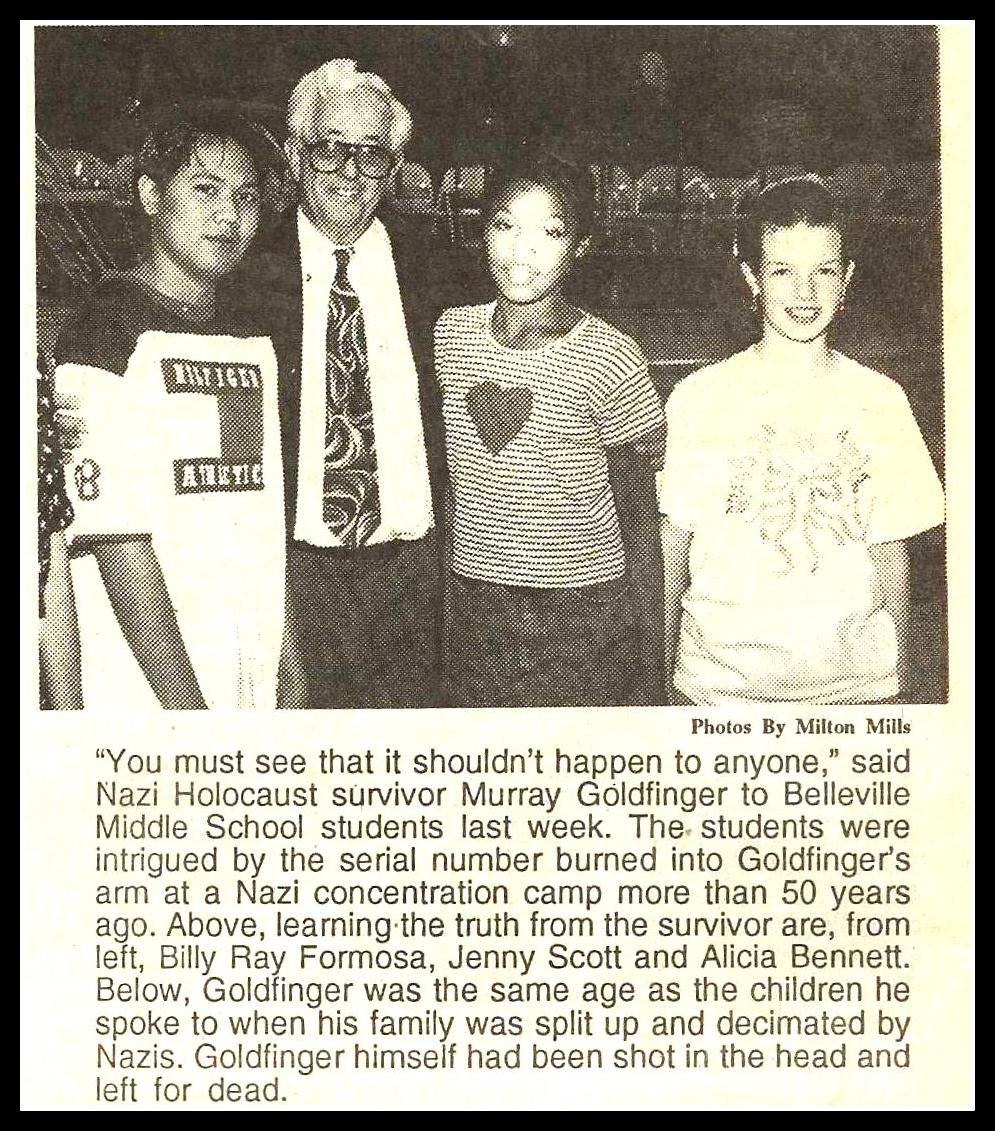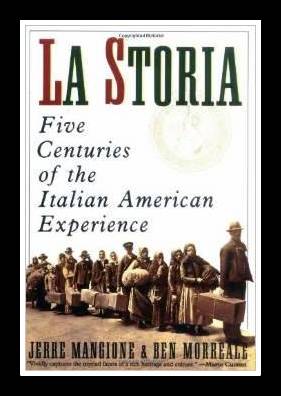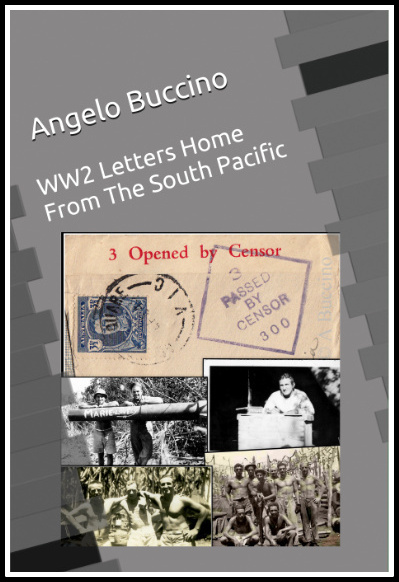Holocaust Camp Survivor Tells Students 'This Must Never Happen Again'By Anthony Buccino
“An animal kills for food. The Gestapo killed for thrills, |
|
|
The Belleville Post, May 29, 1997 -- The gray-haired gentleman with the slight accent called a youngster to stand beside him in front of Belleville Middle School students on May 20. The old man, the youngest of nine children, put his arm around the child and told the students that when the story he tells began, he was as young as the boy beside him. Murray Goldfinger was the youngest of nine children in a Jewish family who had lived in the same Polish town for more than 200 years. In 1940, his 11-member family was relocated with only the things they could carry from their farm to a two-and-a-half room ghetto apartment. Ghettos were set off from the rest of the city by high walls. To this day, when Goldfinger sees the highway sound barrier walls, he starts to sweat remembering the horrors and anguish of his family’s misery in the Nazi ghettos. The Jews had their jobs taken away. Children were not allowed to go to school. There was no money to pay rent or buy food. Their immediate survival in the ghetto hinged on their ability to trade in the black market outside the ghetto – and if the Jews were caught, they were killed. Any Jew caught outside the high walled ghetto was executed. Goldfinger told the students his older brother had married the year before the Nazis took over. That same brother was accused of tearing a dollar bill and got six months in jail. When his brother had finished serving his jail term, on the day he was to be released, he was executed. This, Goldfinger reminded the students, did not happen thousands of years ago, it happened in this century, less than sixty years ago. In 1941, the Nazis devised the “Final Solution”. First, they herded all the Jews into the horrible conditions of the ghettos. Then, by the thousands, the Jews were taken on trains for three to five days without food, water or rest stops. “The worst torture of the train trips was for the children because they didn’t understand why they had no food, no water, no nothing,” Goldfinger said. The final destination for the train riders was one of the five death camps: Auschwitz, Bergen-Belson, Buchenwald, Dachau or Treblinka. Using gas chambers, the Nazis turned the camps into slaughterhouses killing 10,000 people a day, Goldfinger said. “Other Jews were taken in trucks, old people, and children were taken into the woods and executed. ‘Taking you to Paradise,’ the victims were told. And 35,000 people were killed,” he said. “Yet as long as they had one last breath, the Jews hoped that a miracle would come.” When he was 12 years old, Goldfinger was sent to a camp. “I was lucky. I was assigned to a civilian as a messenger,” he said. “An animal kills for food. The Gestapo killed for thrills, without remorse. I learned to never show fear. If you showed fear, they would torture you,” Goldfinger said. In one extermination center, the Nazis held 20,000 Russian prisoners of war who had surrendered. The Germans wanted to see how long the POWs could survive without food and water. “In four to five months, all the prisoners were dead,” Goldfinger said.
While assigned as a laborer in a coal mine, Goldfinger reported that after surviving two months – "which was incredibly lucky – my luck ran out, my shovel broke.” The guard took his number – 161108 – which had been indelicately tattooed onto his left arm at Auschwitz. In front of other prisoners, prisoner 161108 was charged with sabotage. He was shot in the head and left for dead. Although conscious, he did not move. When the work detail came to bury him, he was able to sneak back into a different barrack to avoid the same guard who thought he had killed him and might recognize him. One day before liberation, an American fighter plane circled Buchenwald and shot at the guards who ran away or were killed. Goldfinger remembers the Liberation on April 10 and April 11, 1945. When the war was over, he wanted revenge. He said he and the other teen-age survivors had become uncivilized. For years they had had no education, no adult supervision and had seen more hideous tragedy than people who had lived lifetimes. The children were taken to Switzerland where they learned basic behaviors including once again eating with utensils. Goldfinger was the only survivor of his 11-member family. In Switzerland, as he learned to become human again, he learned, “don’t forget the past, but don’t live in it.” Goldfinger says that he tells his incredible story of horrors and survival so the next generation will see “that it shouldn’t happen to anyone.” “Thirteen-year-olds already have to fight for survival,” he said, looking squarely into the young audience. “Don’t get yourselves down, solve it with your friends and parents.” First published in The Belleville Post, on May 29, 1997. © 1997 by Anthony Buccino A Debt To Honor: Ordinary Italians risked all saving Jewish strangers Holocaust survivor to share memories in Kristallnacht talk Holocaust survivor Goldfinger tells people how he survived as he visits the former Nazi concentration camp Buchenwald near Weimar
Read More A Father's Place, An Eclectic Collection Who is Brother, (who is) Uncle Bim?
WW2 Letters Home From The South Pacific La Storia: Five Centuries of the Italian American Experience by Jerre Mangione Una Storia Segreta - Lawrence DiStasi Finding Italian Roots by John Philip Colletta They Came In Ships by John P. Colletta Italian American Writers On New Jersey Identity Lessons: Contemporary Writing About Learning to Be American
Shop Amazon Most Wished For Items Web site will receive a stipend for purchases made through Amazon link. Support this site when you buy through our Amazon link. |
ANTHONY'S WORLDAnthony Buccino
Essays, photography, military history, moreNew Jersey author Anthony Buccino's stories of the 1960s, transit coverage and other writings earned four Society of Professional Journalists Excellence in Journalism awards. Permissions & other snail mail: PO Box 110252 Nutley NJ 07110 Follow Anthony Buccino WW2 Letters Home From The South Pacific resqme Emergency Keychain Car Escape Tool, 2-in-1 Seatbelt Cutter and Window Breaker
|






